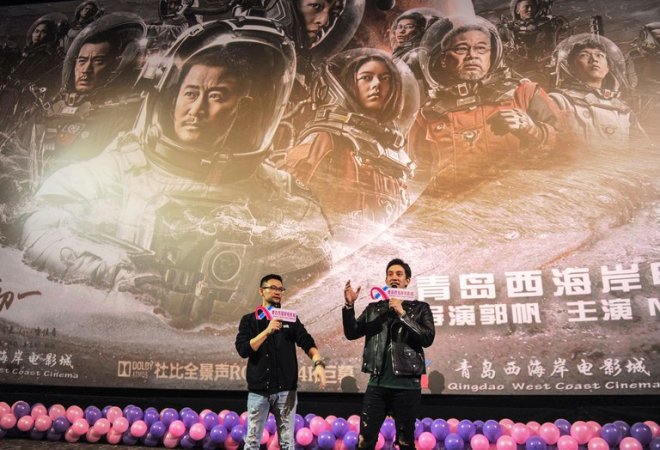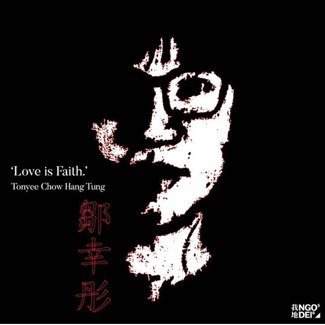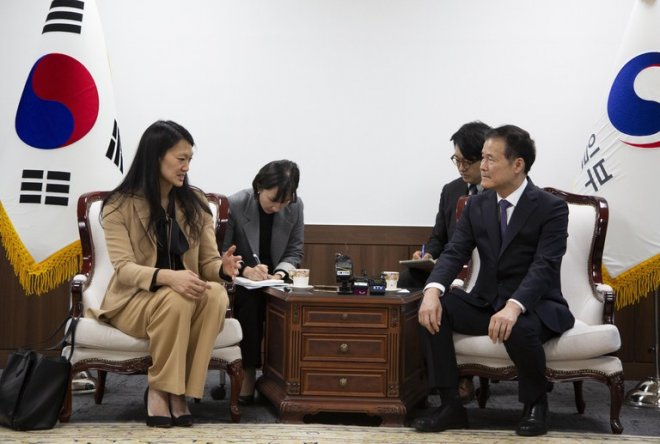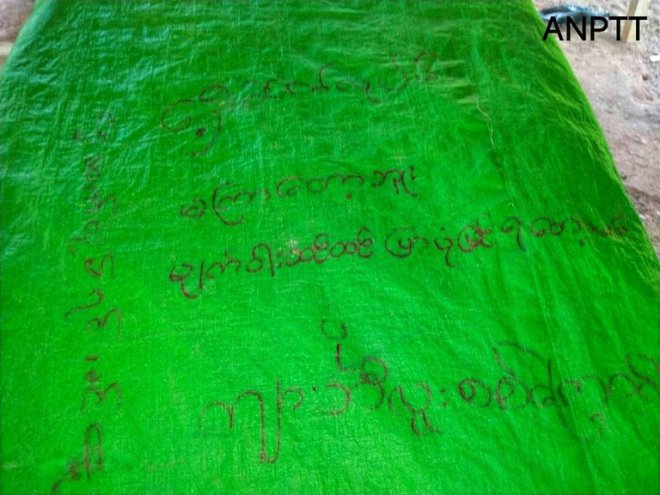Chinese commentators hail propaganda win for blockbuster ‘The Wandering Earth II’
The U.S.$163 million Lunar New Year blockbuster movie Wandering Earth II is seen by many in China as the bleeding edge of nationalistic futurism, aligned with ruling Chinese Communist Party leader Xi Jinping"s vision of a Sinocentric world led by his personal brand of political ideology, and more than able to take on U.S.-led notions of individualistic heroism and freedom.
Executive producer Fu Ruoqing said the show, which boasts a plethora of jaw-dropping special effects in its vision of a China-led planet trying to avoid being swallowed by a dying sun, offers a story in which the world is saved by Chinese scientists.
"[In the film,] Chinese scientists showed that we have the capability of and there is possibility of "wandering" with the Earth [to escape destruction]," Fu said in a recent interview with state broadcaster CCTV.
"In fact, it is concerned with the concept of "a community with a shared future for mankind"," Fu said, quoting one of Xi"s political buzzwords verbatim.
Fu said the movie was "a milestone in China"s history of film," boasting slick science fiction as well as showcasing China"s "values."
CCTV said the movie "is set to lift Chinese cinema to new heights, and shares a strong message for the need for greater global cooperation during troubled times."
In that respect, the movie appears to be an appropriate successor to The Wandering Earth (2019), which was based on a novella by sci-fi master Liu Cixin about Chinese taikonauts trying to save the Earth from an unstable sun – a theme that echoes the plot of Liu"s "Three-Body Problem" trilogy.
Set in a far-distant future, where the dying sun threatens to extinguish all life on Earth, the film shows an attempt to relocate the planet to orbit a safer star.
Overseas reception
While its sequel Wandering Earth II – which wasn"t penned by Liu – enjoyed box-office takings of more than 500 million yuan (U.S.$73.7 million) on the first day of its release in China over the Lunar New Year holiday, it has been slightly less well-received by overseas critics, garnering a low score of 30% in a review from The New York Times, prompting ire on Chinese social media.
"What they are afraid of, and what they try to slander, is exactly what we must insist on," wrote Weibo user Gongli_22 from Guangdong, in a reaction to the New York Times review, which was trending as a hashtag on the social media platform this week. "Propagandists can no longer sit idly by."
Movie commentator Lang Yanzhi said the movie has been subject to "constant attacks and slander," especially in the Western media and by "pro-Western forces."
"Clearly, The Wandering Earth II is more than just a movie: it"s rather a symbol of great influence," Lang wrote on Jan. 23.
User @Looking_at_the_scenery_from_the_clouds said "they"re rattled," with a laughing emoji.
"Earth II is all about Chinese self-confidence, and the export of Chinese values, which is fantastic," the user wrote.
@Wuhan_Jinxiao agreed, writing on Jan. 31 that the movie is being criticized because "it is strong."
"It uses hard power to prop up a grand narrative that China will lead the whole of humanity in the future, which arouses strong panic among anti-China forces," the user said.
![]() Director Guo Fan
Director Guo Fan
Executive producer Fu Ruoqing said the show, which boasts a plethora of jaw-dropping special effects in its vision of a China-led planet trying to avoid being swallowed by a dying sun, offers a story in which the world is saved by Chinese scientists.
"[In the film,] Chinese scientists showed that we have the capability of and there is possibility of "wandering" with the Earth [to escape destruction]," Fu said in a recent interview with state broadcaster CCTV.
"In fact, it is concerned with the concept of "a community with a shared future for mankind"," Fu said, quoting one of Xi"s political buzzwords verbatim.
Fu said the movie was "a milestone in China"s history of film," boasting slick science fiction as well as showcasing China"s "values."
CCTV said the movie "is set to lift Chinese cinema to new heights, and shares a strong message for the need for greater global cooperation during troubled times."
In that respect, the movie appears to be an appropriate successor to The Wandering Earth (2019), which was based on a novella by sci-fi master Liu Cixin about Chinese taikonauts trying to save the Earth from an unstable sun – a theme that echoes the plot of Liu"s "Three-Body Problem" trilogy.
Set in a far-distant future, where the dying sun threatens to extinguish all life on Earth, the film shows an attempt to relocate the planet to orbit a safer star.
Overseas reception
While its sequel Wandering Earth II – which wasn"t penned by Liu – enjoyed box-office takings of more than 500 million yuan (U.S.$73.7 million) on the first day of its release in China over the Lunar New Year holiday, it has been slightly less well-received by overseas critics, garnering a low score of 30% in a review from The New York Times, prompting ire on Chinese social media.
"What they are afraid of, and what they try to slander, is exactly what we must insist on," wrote Weibo user Gongli_22 from Guangdong, in a reaction to the New York Times review, which was trending as a hashtag on the social media platform this week. "Propagandists can no longer sit idly by."
Movie commentator Lang Yanzhi said the movie has been subject to "constant attacks and slander," especially in the Western media and by "pro-Western forces."
"Clearly, The Wandering Earth II is more than just a movie: it"s rather a symbol of great influence," Lang wrote on Jan. 23.
User @Looking_at_the_scenery_from_the_clouds said "they"re rattled," with a laughing emoji.
"Earth II is all about Chinese self-confidence, and the export of Chinese values, which is fantastic," the user wrote.
@Wuhan_Jinxiao agreed, writing on Jan. 31 that the movie is being criticized because "it is strong."
"It uses hard power to prop up a grand narrative that China will lead the whole of humanity in the future, which arouses strong panic among anti-China forces," the user said.
 Director Guo Fan
Director Guo Fan and American actor Michael Stephen Kai Sui attend a promotional event for the original "The Wandering Earth" in Qingdao in China"s eastern Shandong province, Feb. 17, 2019. Credit: AFPMeanwhile, user @chaitaibenzun likened the New York Times review to the dumping of Japanese propaganda materials out of planes in China during World War II.
"China"s blood is up ... but they only want stuff that is in line with the West," the user wrote, while @Film_and_television_variety_show_king wrote on Jan. 28: "If the enemy is fearful, then we"re doing something right. A successful cultural export."
Many users said they were blown away by the special effects, particularly the scenes involving a space elevator, while others complained about its length.
@Han_Dongyan said the review was evidence enough that the movie had done its job in wielding influence overseas, while @Observer_Network merely commented "Sour grapes!" amid dozens of similar comments.
"It really blew me away in the theater," a Shanghai film and TV worker who gave only the surname Liu told Radio Free Asia. "I think the online reviews were right – especially about the space elevator at the beginning. That was so cool."
"I think overall the investment was money well spent because the sets were really cool," he said, adding that the plotting was likely the movie"s weakest point.
‘A huge stumbling block’
Former Hollywood Producer Chris Fenton, author of a book about the movie industry in China, said production values have improved in leaps and bounds in the Chinese film industry, but blamed the weak plot-line on the government"s insistence that it illustrate the Communist Party"s "core values."
"In the West, the system works for the people; but in China, the people work for the system," Fenton said. "Until recently, collectivism and a group mentality have been the dominant philosophy."
"The idea of true individualism, freedom of creative expression, has been very limited, [while] the process of storytelling is heavily censored and policed, which is a huge stumbling block to translating original ideas on the international stage," he said.
![]() Chinese writer Liao Yiwu poses during a photo session in Paris on April 02, 2019. Credit: AFP file photoGermany-based writer Liao Yiwu was less circumspect.
Chinese writer Liao Yiwu poses during a photo session in Paris on April 02, 2019. Credit: AFP file photoGermany-based writer Liao Yiwu was less circumspect.
"I regarded "The Wandering Earth" as a propaganda project of the Communist Party, using writers like Liu Cixin to package nationalism and authoritarianism within the sci-fi genre," Liao told Radio Free Asia. He said the problems have persisted with the movie"s sequel, which he likened to "a promotional film."
Online commentators have pointed out that one of the characters appears to have been modeled on late premier Zhou Enlai, while a Chinese Communist Party emblem is still being worn by a Chinese representative millions of years into Earth"s future, and the initials CCP appear on another character"s shirt.
"This is a nationalist commercial blockbuster packaged with ideas of so-called world unity and common human life," wrote Twitter user "Mr Li."
Another blogger said the entire movie was dominated by "straight male" characters, with the few female characters reduced to instrumental roles, while foreigners are either "in the way" or "stupid."
Weibo influencer Pingyuan_Gongzi_Zhao_Sheng wrote that "The Wandering Earth 2" is less concerned with freedom, human rights or "listening to your inner voice" than about "mutual assistance, responsibility and unity."
"People who have been brainwashed by American universal values for a long time will definitely not like it," the user wrote, in a comment that was retweeted more than 6,000 times.
Translated by Luisetta Mudie.
[圖擷取自網路,如有疑問請私訊]
"China"s blood is up ... but they only want stuff that is in line with the West," the user wrote, while @Film_and_television_variety_show_king wrote on Jan. 28: "If the enemy is fearful, then we"re doing something right. A successful cultural export."
Many users said they were blown away by the special effects, particularly the scenes involving a space elevator, while others complained about its length.
@Han_Dongyan said the review was evidence enough that the movie had done its job in wielding influence overseas, while @Observer_Network merely commented "Sour grapes!" amid dozens of similar comments.
"It really blew me away in the theater," a Shanghai film and TV worker who gave only the surname Liu told Radio Free Asia. "I think the online reviews were right – especially about the space elevator at the beginning. That was so cool."
"I think overall the investment was money well spent because the sets were really cool," he said, adding that the plotting was likely the movie"s weakest point.
‘A huge stumbling block’
Former Hollywood Producer Chris Fenton, author of a book about the movie industry in China, said production values have improved in leaps and bounds in the Chinese film industry, but blamed the weak plot-line on the government"s insistence that it illustrate the Communist Party"s "core values."
"In the West, the system works for the people; but in China, the people work for the system," Fenton said. "Until recently, collectivism and a group mentality have been the dominant philosophy."
"The idea of true individualism, freedom of creative expression, has been very limited, [while] the process of storytelling is heavily censored and policed, which is a huge stumbling block to translating original ideas on the international stage," he said.
 Chinese writer Liao Yiwu poses during a photo session in Paris on April 02, 2019. Credit: AFP file photoGermany-based writer Liao Yiwu was less circumspect.
Chinese writer Liao Yiwu poses during a photo session in Paris on April 02, 2019. Credit: AFP file photoGermany-based writer Liao Yiwu was less circumspect."I regarded "The Wandering Earth" as a propaganda project of the Communist Party, using writers like Liu Cixin to package nationalism and authoritarianism within the sci-fi genre," Liao told Radio Free Asia. He said the problems have persisted with the movie"s sequel, which he likened to "a promotional film."
Online commentators have pointed out that one of the characters appears to have been modeled on late premier Zhou Enlai, while a Chinese Communist Party emblem is still being worn by a Chinese representative millions of years into Earth"s future, and the initials CCP appear on another character"s shirt.
"This is a nationalist commercial blockbuster packaged with ideas of so-called world unity and common human life," wrote Twitter user "Mr Li."
Another blogger said the entire movie was dominated by "straight male" characters, with the few female characters reduced to instrumental roles, while foreigners are either "in the way" or "stupid."
Weibo influencer Pingyuan_Gongzi_Zhao_Sheng wrote that "The Wandering Earth 2" is less concerned with freedom, human rights or "listening to your inner voice" than about "mutual assistance, responsibility and unity."
"People who have been brainwashed by American universal values for a long time will definitely not like it," the user wrote, in a comment that was retweeted more than 6,000 times.
Translated by Luisetta Mudie.
[圖擷取自網路,如有疑問請私訊]
|
本篇 |
不想錯過? 請追蹤FB專頁! |
| 喜歡這篇嗎?快分享吧! |
相關文章
AsianNewsCast



















